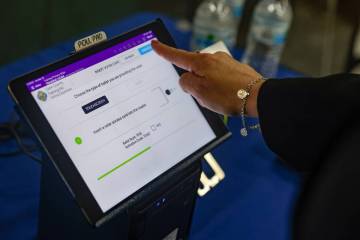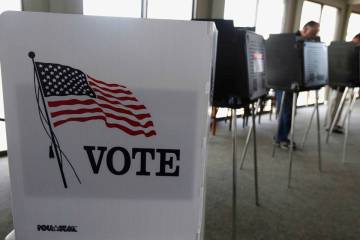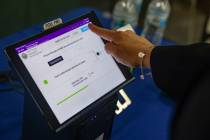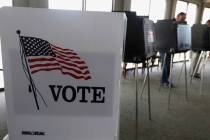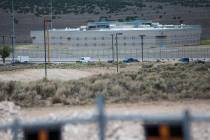Law fosters freedom, safety
If there’s an emergency, if one of her three kids gets hurt and has to go to the doctor, then Maribel Salivar starts her car and puts the pedal to the metal — no questions asked, no doubts left in her speedy wake.
“I only drive when I absolutely have to,” says a Spanish-speaking Salivar, who has been living in Nevada illegally for close to five years, straight from Mexico City. “I only drive if it’s a matter of life or death, though. Otherwise, I don’t dare chance it.”
She says she doesn’t take the risk because she knows she’s not supposed to be in the United States, much less driving a car around Las Vegas.
Next year, however, all that could change, and Salivar, regardless of her status, will have a choice: Either keep doing what she’s doing or hit the nearest DMV office, apply for a driver’s authorization card, then drive away from the place — legally.
Salivar says she’s going to choose the latter.
“I can’t wait,” says Salivar, who, irony of ironies, works for a business that specializes in registering vehicles to the state of Nevada for those who don’t know how to do it themselves, don’t have the time or are outright afraid to because of their illegal status.
The new law, which Republican Gov. Brian Sandoval signed last week, puts Nevada on that progressive, pro-immigrant map, making the Silver State the fourth in the country to embrace such a concept — behind Washington state, Utah and New Mexico.
RALLYING CRY: SAFER ROADS
In what was hailed as a historic day, the state’s first Hispanic governor, with a bipartisan brood gathered around him during Friday’s signing, rejected the notion that state Senate Bill 303, which takes effect on Jan. 1, was somehow politically motivated — a mere strategy by Republicans to curry favor among a disheartened Latino electorate.
Instead, Sandoval stuck to what by now has become the mantra behind the bill’s passage: Nevada’s roads will be safer because immigrants will have to pass driver’s license tests to get their card; they will now purchase insurance; there will be fewer immigrants fleeing minor fender-benders because they aren’t doing anything illegal.
“If you think about it, the law is really a wash for the undocumented because many of them are driving here regardless. Which is what we already knew. Which is why we were even addressing the issue,” says Peter Ashman, a high-profile immigration attorney in Las Vegas. “The real idea behind it is to protect people from being rear-ended and then having somebody flee the scene.”
Whatever the law’s true intent, as many as 60,000 people are expected to apply for the card for $22 apiece .
Only time will tell whether the plan works, roads become safer and insurance businesses see a spike in new policies.
But this much is certain: Nevada is the latest in a growing chorus of states to take matters into its own hands in the absence of immigration reform by the federal government.
And it’s not always just about driver’s authorization cards.
In California and Colorado, for example, so-called DREAMers — children who were brought to the United States illegally by their parents and were educated here in high schools — can now qualify for in-state tuition at state colleges and universities.
In New York City, there’s a push to allow non citizens who live there permanently to vote in local elections.
RACIAL PROFILING QUESTION
And now comes the most up-to-date controversy involving people in the country illegally, notes Matt Baretto, a political science professor and pollster: How are individual states going to handle the issue of Obamacare, otherwise known as the Patient Protection and Affordable Care Act ?
Under this new law, people who are in the country illegally do not qualify and no one is suggesting otherwise. But in screening people for Obamacare, will government officials be allowed to ask for proof of citizenship, which could be labeled racial profiling by critics?
“Are the federally funded health care centers going to point-blank ask for legal status or are they going to back off?” Baretto wonders.
It’s the big question making the rounds, he says, and how individual states react to it is going to prove interesting.
“Different states are going to handle things differently,” says Baretto, the founder of Latino Decisions, a polling company, and a professor at the University of Washington in Seattle. “What we’re seeing now makes perfect sense: states are starting to adjust their state laws accordingly, as they pertain to their own best interests.”
The outcome, Baretto notes, isn’t always as pleasant for the immigrant.
In the more conservative states of Arizona, Alabama and Georgia, for example, some of the laws hinge on outright racial profiling, often leading to the deportation of those who are pulled over by local police. These crackdowns have led to immigrants moving to other more friendly states.
CHANGE CAN HURT
Now comes Nevada’s new driver’s authorization card. It could very well result in a flood of immigrants crossing into Nevada from California, predicts Abigail Diaz, who owns DMV VIP Services in the 200 block of North Eastern Avenue.
Tucked away in a strip mall in the heart of the Latino community, the company specializes in registering vehicles in the state of Nevada. Ninety percent of its customers are Latino immigrants who either don’t have the time to do it themselves or, in many cases, “are afraid to.”
If there were ever an expert on Nevada driving laws, it would be Diaz, who has owned her niche business for nearly two decades and has seen the changes over the years up close .
The greatest misunderstanding, Diaz notes, is that one needs a driver’s license to register a vehicle in Nevada. As a result, Diaz has served as the go-between, earning as much as $100,000 a year when times were booming by simply handling the paperwork and getting vehicles registered.
Then there’s this little fact that many might not be aware of: It was relatively easy in the 1990s for people in the country illegally to get driver’s licenses in Nevada, and they’re still doing it today through renewals that stretch back that far .
This year alone, she said, she has renewed as many as 1,000 legitimate Nevada driver’s licenses to the immigrants who acquired them fairly — before the 9/11 terrorist attacks put the clamp on that practice.
And even though driver’s licenses may have been hard to come by in a post-9/11 world, that doesn’t mean immigrants weren’t getting licenses — some obtained international driver’s licenses from their own countries, whether Ecuador, El Salvador, Peru, Nicaragua or another South or Central American nation.
Mom-and-pop shops that added wire transfers to their well-stocked grocery shelves had little problem in branching out as they catered to a community of ID-less people.
La Casa Latina is one such business. It’s directly across the street from DMV VIP Services.
Maria Aguilar, a DREAMer who attended Torrey Pines High School, personally looks forward to the day when she can drive legally. But the new law could signal the beginning of the end to her business, which is to secure dozens of customers a week their international driver’s licenses by sending off their paperwork to other countries.
She makes $180 every three days, but starting next year, that customer base is expected to dwindle considerably.
“How can you compete against $22,” she says. “Immigrants are generally poor as it is, and I know that they’re pretty excited about being able to drive here.”
Contact reporter Tom Ragan at tragan@reviewjournal.com or 702-224-5512.




